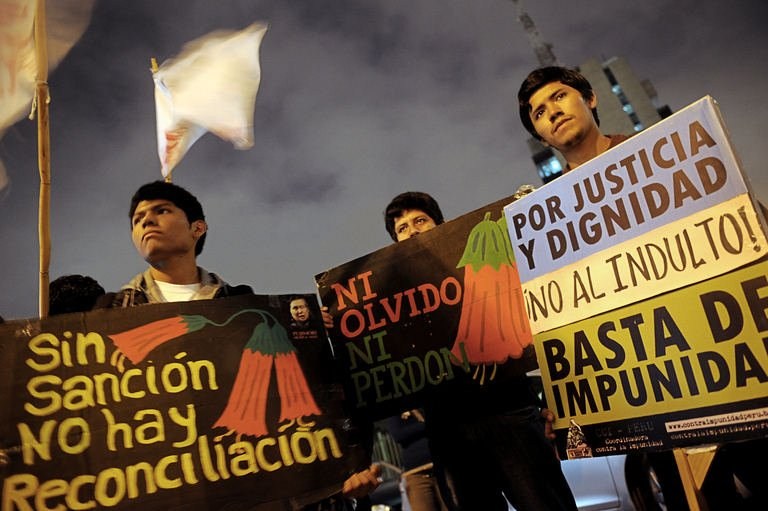






Washington, DC, June 23, 2017.- The Due Process Foundation (DPLF), the Center for Justice and International Law (CEJIL) and the Washington Office for Latin American Affairs (WOLA) express their concern regarding the increasing pressure being put on the President of the Republic of Peru by various sectors to grant humanitarian pardon to former President Alberto Fujimori.
Alberto Fujimori was sentenced to 25 years’ imprisonment in a judicial process that respected the guarantees of due process. Through this process his responsibility in several criminal acts was proved, including the massacre of 15 people in Barrios Altos, including a child of eight years, the enforced disappearance of ten people from La Cantuta University, and the kidnapping of Gustavo Gorriti and Samuel Dyer. This trial and its sentence have been an example to the world of the fight against impunity.
The presidential pardon is the power of the President of the Republic, but there are limits to its application, both by national legislation and by international law.
International law prohibits the application of amnesties, pardons, or other exclusions of responsibility to persons found guilty of crimes against humanity. In this regard, the Inter-American Court of Human Rights found that the crimes perpetrated in the La Cantuta case constitute crimes against humanity. The responsibility of former President Fujimori for the Barrios Altos and La Cantuta cases and the character of the charges against him were subsequently confirmed by the Special Criminal Chamber of the Supreme Court of Peru in his sentence of April 7 Of 2009, and ratified by the Transitory Criminal Chamber of the Supreme Court in a judgment dated December 30, 2009.
The organizations that subscribe to this press release emphasize that every person in the custody of the State has the right to have their dignity and personal integrity respected. For Fujimori to benefit from a humanitarian pardon under domestic law, he would have to fulfill one of two requirements: to have a terminal illness or a severe illness in an advanced, degenerative and incurable state, or to be suffering prison conditions that seriously endanger his life and health. However, the information disseminated by the media in Peru does not reveal Mr. Fujimori to be suffering from a medical condition of this size and reveals his prison situation to be adequate with access to medical treatment.
In correspondence with the above stated facts, we hope that the decision on the recent request for a humanitarian pardon for Alberto Fujimori will be carried out with total transparency and in respect of the human rights treaties ratified by Peru.
“A different position would put Peru on the list of countries with serious human rights retreats and would encourage the idea that the most serious crimes that attack humanity as a whole can be forgiven without the consent of the victims,” said Katya Salazar, director of DPLF.
Jo-Marie Burt, WOLA’s senior adviser, recalls, “There are numerous attempts by the family of Alberto Fujimori to ignore the conviction of the former president for serious violations of human rights. These actions demonstrate a profound lack of respect for the rule of law, something that was characteristic of his government. Mr. Fujimori must serve his sentence like any other person convicted of such grave crimes, unless his health deteriorates. “
“The conviction of Alberto Fujimori constituted a decisive step inside and outside the borders of Peru in the fight against impunity” said Viviana Krsticevic, Executive Director of CEJIL. “Although the President of the Republic has the power to grant a pardon, there are limits to its application. The government cannot give in to pressures that ignore the national and international obligations of Peru in this matter.”
We hope that the decision of President Pedro Pablo Kuczynski will be based exclusively on the need for Alberto Fujimori to enjoy a treatment compatible with his health conditions and according to the procedures applicable to all persons deprived of liberty in the country.
Help us continue this critical and urgent work with a donation!
DONATE NOW